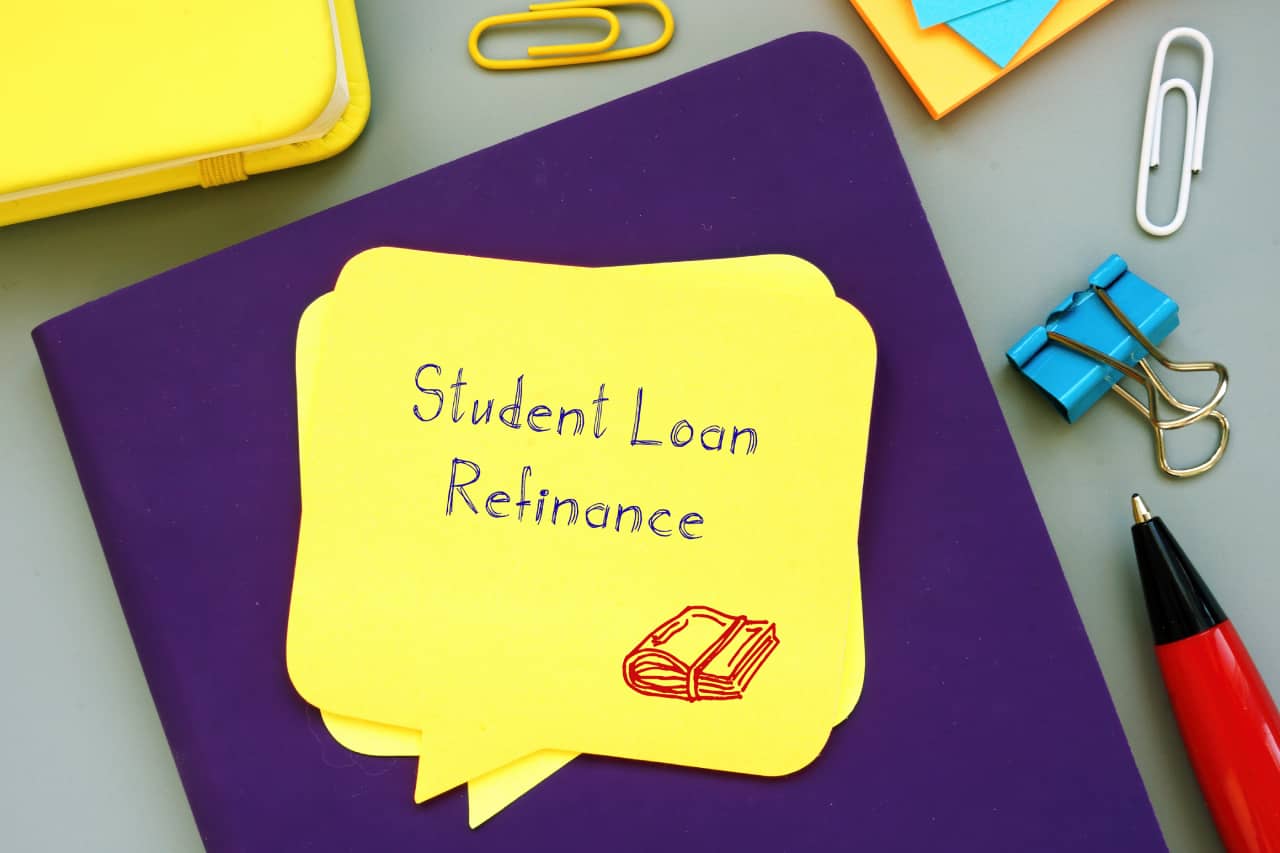If you just finished college or are a parent of a college graduate, you know for a fact that obtaining any degree demands great financial sacrifice. This is especially true over the past decades as the cost of attending either a university or public college institution has nearly tripled.
This is why it’s estimated that more than half of American college students will go into debt after they step out from college; a college graduate in America may have a student loan doubt of up to USD$37,500 in 2020. (7)
Since education is crucial, everyone must do their best to finish college, like finding ways to fund their college education. But do they have to sink in debt doing so? Fortunately, student loan refinancing may mitigate this problem.

What is student loan refinancing?
Student loan refinancing is a situation wherein a non-federal lender, or a private lender, will pay off your existing student loans as they’ll provide you with a new loan with a new set of terms.
At first glance, this may sound like student loan consolidation. This notion is understandable since both terms are often confused due to their similarity. But there’s a difference between student loan refinancing and the latter; mainly, the advantage of what the former brings.
For one, student loan consolidation is when a federal program, as the name suggests, consolidates your federal loans into one. The interest of such consolidation will be derived from the average of your loans. With this setup, you can see that it won’t offer you any savings, but it’ll be much easier to see how much you owe. (5)
Meanwhile, student loan refinancing will still consolidate your preexisting loans, but it’s not limited to federal student loans. It also takes into consideration your private loans. As mentioned above, student loan refinancing involves a private lender paying off your loans. Since private lenders don’t really have to necessarily operate in the same way as federal ones, they can offer you more leeway to pay off your loans. (5)
Conveniently, you can check out various sources online, like educationdata, to compare lenders willing to refinance your student loans.
How student loan refinancing works
To put it in a much clearer picture, suppose you have USD$45,000 student loan debt with an interest rate of 8%. With this computation, you’re obliged to pay around USD$360 monthly for a decade or so.
Now, when you apply for student loan refinancing, they can lower the interest rate to, say, 5%. This means your monthly payments would decrease to around USD$225. With this reduction in interest rate, you can perhaps use the money you’d save for other important things, like buying a house.
Qualifications
As good as student loan refinancing may sound, not everyone can qualify for this. For one, refinancing companies use different criteria to assess your eligibility to refinance. For instance, they might require that you have a good credit score (600 or more), as well as a steady flow of income. (1)
This being said, the next sections would help you gauge if student loan refinancing will be the right move for you.
Is student loan refinancing right for you?
Take note that the goal of student loan refinancing is to secure a much lower interest rate. (3) This being said, here are a couple of signs that student loan refinancing is right for you.
1. You are willing to find the right lender
Since there are plenty of lenders available, looking for one that suits your financial needs may take a while. So, you have to invest your time and effort sieving through various lenders–comparing offers in the hopes of finding the best deal for you. (2)
2. You have a good credit score
As mentioned above, lenders won’t easily agree with a student loan refinancing. One of the criteria they’ll use is your credit score. Hence, if your credit score is below 600, then don’t bother looking for a lender in the first place. Additionally, you might also check out a lender’s website regarding the minimum credit score they accept. (2)
Also, having a good credit score, especially if you have more than what the lender considers as their minimum, may grant you a much lower interest rate. Thus, it’s in your due diligence to ensure that your credit score is in excellent condition.
3. Your income is more than your debts
In addition to your credit score, lenders would also take into account your debt-to-income ratio. This means that your debt shouldn’t be more than, equal, or closely match your income. Hence, if your monthly income is around USD$1,500, then your overall debt should be $USD1,400-1,500.
If this is the case for you, then there’s a high chance that lenders won’t refinance your student loans since it’ll be less likely for you to pay them, especially if your income suddenly drops. As a tip, it’s best if you have a budget so you can properly control your money.
Signs you shouldn’t refinance your student loans
Now that you have a couple of indicators that you can refinance your student loans, it’s now time to know a couple of signs that you shouldn’t even bother considering this setup.
1. It will take a long to pay off your loans
As mentioned, the main goal of student loan refinancing is to shorten the amount of time paying your student loans. This means that you shouldn’t go for it if you find yourself paying for more years to come. For instance, if you’re already in your fifth year into a decade loan term, and you decide to refinance for a new 10-year loan. This means you’ll pay more interest since you’ll now be repaying loans for 15 years. (1)
2. You are financially unstable
It’s important to note that private lenders don’t have forbearance the same way as federal student loans. Thus, if your income is unstable or constantly fluctuates in the near future, it’s best to hold off refinancing your loans until you’re already financially secure. (4)
3. You are bankrupt
Even though it’s still possible to refinance student loans if you’re bankrupt, it might be much more difficult to do so. For instance, lenders would require four to 10 years after you declare bankruptcy so they can consider you for a loan.
4. Poor credit
Since good credit is one of the essential requirements to qualify for a student loan refinancing, having a bad one means that it’ll be harder for you to qualify, hence it’s still possible. However, you may face a much higher interest rate compared to if you have good credit. (4)
How to refinance your student loans?

Now that you’re well-equipped with information to help you decide whether student loan refinancing is right for you, it’s now time to assess for yourself if you’re going to refinance your loans. Take note that refinancing your student loans is a big decision, so you must take the time to consider this financial responsibility.
After carefully considering the pros and cons, if you still think that this is the best option to make, it’s now time to refinance your student loans. To help you out, here are the steps you can take to get started:
- Research lenders: As stated above, there are plenty of lenders willing to refinance your student loans. What’s left for you to do is to find one that suits your needs.
- Compare rates and terms: When it comes to choosing one that suits your needs, in addition to the interest rates that lenders provide, make sure to also consider their repayment terms and other fees.
- Choose the best offer: With all things considered, it’s now time to choose the best offer, which, again, will depend on your preferences. You can look for one with a shorter repayment term so you can pay off your loan faster, or you can also choose one that has a longer repayment term to reduce your monthly payment. The latter is the best option if you don’t want to strain your monthly budget.
- Fill out a form: Once you find a lender, you can then proceed to contact them so you can fill out the needed application form. In this step, you might also be required to submit documents like your tax returns or payslip.
- Pay your loans religiously: If your chosen lender already approved your student loan refinancing, what’s left for you to do now is to pay your loans religiously. Doing so may also increase your credit score, which, as shown above, will provide plenty of benefits. Also, by paying them on time, you might not get yourself into any legal troubles. (4)
Bottom Line
Now that you have the necessary information about student loan refinancing, you can now decide whether it’s right for you or not. However, do note that before venturing into this setup, it’s important to review your financial circumstances. You might also be required to do some math to calculate if it’s the right move for you to make.
Essentially, if you find one that offers you a lower interest rate, have the time and effort to look for the right lender, have a good credit score, and qualify the lender’s requirements, then student loan refinancing is right for you.
References
(1) “What Is Student Loan Refinancing, Really?”, Source: https://www.nerdwallet.com/article/loans/student-loans/what-is-student-loan-refinancing
(2) “7 Signs You’re Ready To Refinance Your Student Loans”, Source: https://thefinancetwins.com/7-signs-youre-ready-refinance-student-loans/
(3) “When to Refinance Student Loans”, Source: https://www.collegeavestudentloans.com/resources/when-to-refinance-student-loans/
(4) “When to Refinance Student Loans”, Source: https://www.credible.com/blog/refinance-student-loans/when-to-refinance/
(5) “The Comprehensive Guide to Refinancing Student Debt”, Source: https://www.commonbond.co/post/the-comprehensive-guide-to-refinancing-student-debt
(6) “How to decide if student loan refinancing is right for you”, Source: https://www.foxbusiness.com/money/student-loan-refinancing-is-it-right-for-you
(7) “Student Loan Debt: 2020 Statistics and Outlook”, Source: https://www.investopedia.com/student-loan-debt-2019-statistics-and-outlook-4772007
If this resourceful article has helped you, please subscribe to our newsletter. Thanks for reading!








